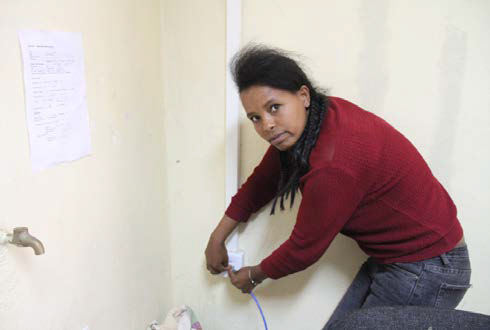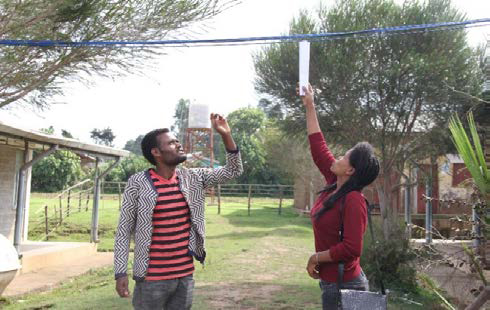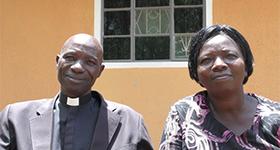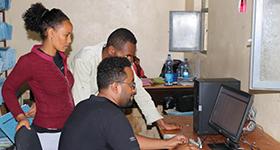Meskerem Mekiso leads a small business enterprise in Ethiopia’s Southern Nations, Nationalities, and Peoples’ Region (SNNPR). She supervises seven employees—three women and four men—who install local area networks (LANs) in the district’s health facilities. By connecting health facilities to the internet, Meskerem and her team are fueling the Information Revolution—an aspect of Ethiopia’s Health Sector Transformation Plan, which uses information technology (IT) to improve health services across the country. At the same time, they are building job skills and increasing employment opportunities in their community.

Meskerem tests a wall outlet at Masbira Health Center. Photo: Etalemaw Hussisso
It started in December 2018, when Meskerem and her colleague Tefera Tadesse enrolled in a small business enterprise (SBE) program after seeing an announcement posted by the district administration office. The program, led by the Federal Ministry of Health (FMOH) in collaboration with the USAID-funded Advancing Partners & Communities (APC) project, trained people to provide IT services to health facilities.
Meskerem and Tefera were ideal candidates. Meskerem graduated from Alpha University College with a degree in information and communications technology, and Tefera had studied electrical and computer engineering at Wachamo University. The SBE program trained them in network installation, configuration, maintenance, and troubleshooting.
“I had learned basic networking concepts theoretically during my stay in the University, but now I have acquired practical experience, especially in LAN installation,” Tefera says.
Meskerem and Tefera also gained an appreciation for building relationships with other IT professionals to exchange ideas, knowledge, and best practices. And the program allowed them to learn from mistakes and enhanced their time-management and leadership skills. Now their SBE has a contract with the regional health bureau and receives a fixed amount for each installation. “I didn’t have any work before, but now I get to work with my friends and I can support myself and my family,” says Meskerem with a broad smile.
“Above getting money and skill, I am feeling better when I see my community is provided quality services with the help of Health Net, which I contributed to.”
—Tefera Tadesse

Tefera and Meskerem inspect the LAN installation at Masbira Health Center. Photo: Etalemaw Hussisso
In SNNPR alone, the program has led to the establishment of 41 SBEs, each with 7–10 employees. More than 320 young people, approximately 150 of whom are women, have found employment through the program. All enterprises are licensed by the respective district administration office and contribute to local economies by paying taxes and generating jobs in their communities.
Not coincidentally, 2018 was also the year that the FMOH and APC started connecting the country’s more than 3,000 health facilities and administrative health units through a virtual private network known as Health Net Ethiopia. More than 250 SBEs are helping this tremendous effort stay ahead of schedule. However, the SBE members are aware that they must raise their profile and develop more skills so they can provide other IT consultancy services in their districts when the Health Net effort is complete. “I strongly need to capacitate myself and contribute to computer and office machine maintenance in my district,” says Tefera.
APC provided technical support for the SBE program, while the Government of Ethiopia is paying the enterprises for installing LAN and connecting facilities to the internet. The introduction of digitized health information systems is part of Ethiopia’s long-term commitment to improving health services for its people. Tefera is happy to be involved. “Above getting money and skill, I am feeling better when I see my community is provided quality services with the help of Health Net, which I contributed to.”






